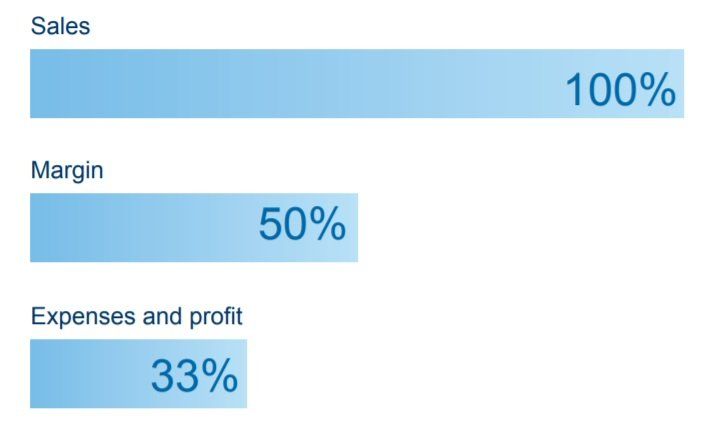Franchising is all about relationships. But does the quality of your relationship with your franchisees have an effect on the performance of your franchise?
And if so, what can you do to improve both?
The relationship between a franchisor and franchisee has been compared to many other kinds of relationships – a marriage, parent-child and so on.
But comparisons are pointless – in reality, franchisor-franchisee relationships are like nothing else.
That’s because they’re not all business – there’s an element of the personal mixed in. It’s because they’re long term relationships – franchise agreements can have terms of up to twenty years. It’s because franchisees’ expectations aren’t always the same as franchisors’, creating tensions in the relationship. And it’s because those expectations change as both franchisors’ and franchisees’ businesses mature.
You might think that none of the above should make a difference to franchise performance in terms of revenues, profitability and royalties – after all, franchisees should just get on with running their own businesses without worrying about their relationship with their franchisors, shouldn’t they?
But that’s not how it works. There is a body of evidence that the franchise relationship does make a difference.
A study of hotel franchises by the Cornell University School of Hotel Administration concluded that “our results clearly show the benefits of strong partnership to be manifold”. These benefits included higher hotel occupancy rates, average room rates, gross operating profits, quality ratings and guest satisfaction than non-franchised hotels and hotel franchises where hotel-franchisor relationships were not strong.
The study also noted that these direct benefits also lead to indirect benefits such as greater franchisee satisfaction and retention and enhanced franchise recruitment.
Research conducted by Franchise Business Review showed that franchises with satisfied franchisees had median annual growth 400% greater than the competition.
But given the complex and evolving nature of franchise relationships, how can you as a franchisor ensure that your relationships with your franchisees will lead to better franchise performance?
As one study noted:
“Though the importance of good franchisor–franchisee relations have long been recognized as critical to the success of franchise systems, little attention has been given as to how this can be achieved.”
Managing the Franchisor-Franchisee Relationship: A Relationship Marketing Perspective
A major factor in this, in my experience, is that most studies take into account franchisors’ expectations, not franchisees’ expectations. One of the few exceptions to this was a study conducted by the Australian-based Franchise Relationships Institute. The study highlighted the tensions that can be created by these differing expectations. Take this example:
The top 3 reasons given by franchisees for buying a franchise:
- Life balance
- Financial gain
- Control own destiny
The top 3 criteria used by franchisors to assess franchisees’ performance:
- Financial performance
- Customer focus
- Cultural fit and compliance
Not surprisingly, the study found that the franchisees who rated life balance most highly performed less well, in the franchisors’ eyes at least, than those who rated financial gain and controlling their own destiny most highly.
The study included profitability as well as sales in franchisors’ criteria for franchisees’ financial performance, but I came across an interesting graph the other day that highlighted another tension in the franchisor-franchisee relationship. The graph was part of an article called Franchising: The Entwined Relationship Between Franchisors and Franchisees
from investment and advisory firm KordaMentha.
Percentage of franchisors who track franchisees’ financials
Source: Asia-Pacific Centre for Franchising Excellence
I was gobsmacked by the finding that only 50% of franchisors bothered to track their franchisees’ margins and only a third seemed to care about how well their franchisees were doing in terms of net profitability.
Should I have been shocked? After all, I know that a key tension in franchise relationships is the different ways franchisors and franchisees make money – franchisors through a percentage of franchisees’ sales and franchisees through their net profitability.
My shock came from the unbelievable short-sightedness of franchisors. Of course, they’re going to be focussed on their franchisees’ sales, because the higher those sales, the more the franchisors make. But can’t they see that their franchisees’ net profitability is the ultimate driver of their franchise’s success?
I’ve mentioned this in some of my earlier articles, but one of the key findings of a best-practice study tour I participated in some years ago was that strategic health – franchisors’ understanding of the value drivers of their franchisees’ businesses – is something all best-practice franchises have in common.
How is it that two-thirds of franchisors aren’t employing best practices in franchising? And what does that say about their relationships with their franchisees?
Now I’ve got that off my chest, and we’ve established the connection between franchise relationships and franchise performance, let’s get back to the title of this article: How would your franchisees rate you?
The hotel study by the Cornell University School of Hotel Administration suggested these four ways for a chain to strengthen its hotel partnerships (and these would apply to any franchisor-franchisee relationship):
- View the relationship as important and genuinely strive to preserve the relationship
- Behave in a stable fashion, refraining from abrupt and frequent changes in strategic direction that confuse and frustrate franchisees
- Develop jointly clear expectations as to what functions franchisees are to perform and how they are to be evaluated, and what support franchisees can expect from the franchisor
- Work in a harmonious way to resolve the inevitable conflicts that arise in any business relationship
The other study mentioned above, Managing the Franchisor-Franchisee Relationship: A Relationship Marketing Perspective, put effective communication at the top of their list because of its role in ensuring shared values and, therefore, a relationship characterised by trust and commitment.
Leadership also emerges in that and other studies as a key requirement for shaping strong franchise relationships.
I’ve come up with 20 questions to ask yourself in order to assess your rating as a franchisor and the health of your franchise relationship.
20 questions to assess the health of your franchise relationships
- Does your franchise have a clear vision and values that you and your team live by? Are your franchisee recruitment, selection and management processes aligned with those vision and values?
- Is the relationship with your franchisees important to you?
- Is your franchisees’ relationship with you and your team important to your franchisees?
- Do you see yourself as a leader rather than a manager?
- Do you set clear guidelines as to the performance you expect from your franchisees and the performance they should expect from you and your team? Do you make it clear how those expectations will be evaluated from both sides?
- Do you set realistic goals for your franchise and give clear explanations for why directions are given?
- Do you and your team walk the talk in terms of being the guardians of the franchise brand and system, and role models for your franchisees?
- Would your franchisees say that you genuinely care about their satisfaction and success?
- Is there a relationship of openness and trust between you and your franchisees? Do they turn to you and your team for guidance and advice, without fear of repercussions?
- Do you create multiple opportunities for communication and engagement with them?
- Do you see innovation and improvement as keys to the continuing success of your franchise? Do you see your franchisees as partners in this, actively seeking ideas and suggestions from them and acting on these where appropriate?
- Do you have reporting mechanisms in place to monitor and benchmark your franchisees’ performance in terms of your franchise’s key value drivers? Do you share performance data and benchmarks for the benefit of the whole franchise? Do you use them to better manage the training and support provided to franchisees?
- Do you tailor your franchisee’s training and support to their differing needs and expectations rather than provide a one-size-fits-all solution?
- Do you monitor franchisee satisfaction on a regular basis and use the results to better manage your franchise?
- Do you try to work issues out in a friendly but direct manner with your franchisees before you turn to mediation or legal remedies?
- Do you deal with poor franchisee performance, breaches of the franchise agreement and other issues in a firm but fair way, offering franchisees guidance and support, but not hesitating to take action where necessary?
- Are you focused on the growth of your business – that is, the franchise as a whole – as well as the growth of franchisees’ businesses?
- Do you keep your promises, and not make promises you can’t keep?
- Are you a rock in times of turbulence, demonstrating resilience and maintaining a positive, optimistic attitude in the face of difficulties?
- Do you recognise the importance of ongoing professional development for yourself as well as your team, understanding that even coaches and mentors need coaching and mentoring if they are to stay ahead of the game?
I've found that the franchisors with the best franchisee relationships are those who not only ask themselves these kinds of questions, but also ask them of their teams and franchisees in order to get a true 360-degree view.
As a franchise consultant, I work with franchisors and their teams to objectively measure their relationships with their franchisees and franchisee satisfaction, and to put in place practical programmes for development and improvement with the aim of lifting franchise performance.
I'm Robin La Pere, no ordinary business expansion and franchise consultant. I've been involved in franchising for more than 20 years, and during that time I've seen how critical the franchisor-franchisee relationship is to the performance and growth of the overall franchise.
If you'd like to improve your franchise's performance and growth, I am one of the few franchise consultants I know who have a combination of franchise management, franchise ownership and franchise consulting experience. I understand the industry at every level and across a wide range of business types. I have helped many franchise systems to develop their relationships with franchisees and improve their results. I recommend you take advantage of my free Initial Consultation
to discuss some of the ways I can help you.
Relevant Articles
Subscribe to my newsletter
"Robin writes an e-letter which anyone interested in franchising should subscribe to - whether they agree with him or not!"
Dr Ken Billot, Franchise PhD
Dr Ken Billot, Franchise PhD
Every two weeks, I write an email newsletter designed for those in franchising and those considering getting into franchising. Topics include those you see in the articles listed above and are intended to be stimulating, helpful and challenging. These articles have helped me gain more than 100,000 followers on Twitter and worldwide connections on LinkedIn, but you can read them first by subscribing to the newsletter.
Subscribe by entering your email address here:
Contact Us
Download your free e-book
A major strength of franchising is that it’s based on tried and true business models. Trouble is, in this fast-changing business environment, what’s tried and true one year may be tired or irrelevant the next.
Not surprisingly, one out of three franchisors is concerned about the viability of their business model.
The 'Business Model Canvas' has emerged as a powerful tool for developing and updating business models. Recognising that franchise businesses differ in several ways from other business types, I have come up with a new version of the Business Model Canvas designed specifically for franchises.
Send me your email and I'll email you my e-book The Business Model Canvas for Franchisors:





